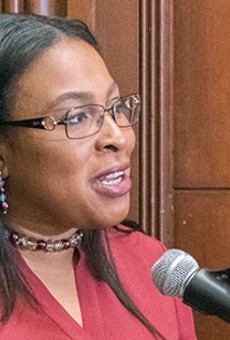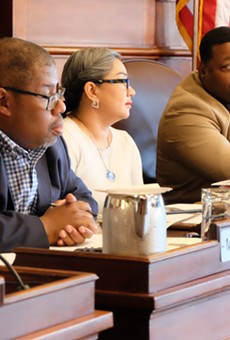A massively destructive battle is underway in Rochester right now, and I can’t imagine that it will end well.
On one side is the Rochester City School District and its all-Democratic school board, joined by local education activists, the teachers union, and Democratic State Assembly members Harry Bronson and Jamie Romeo. On the other side: Rochester Mayor Lovely Warren, Democratic State Assembly member David Gantt, Republican State Senator Rich Funke, and Chamber of Commerce President Bob Duffy.
All of them insist that they’re fighting to help Rochester’s children.
Criticism of the school district isn’t new, and some of it is absolutely deserved. The district doesn’t have a good track record fixing things it has control over: problems in its special education program, for instance. Poor staff training. Poor oversight. Curriculum problems.
But the district’s biggest challenge – the concentrated poverty in which most of its students live – is way beyond its control. Rochester’s children won’t get the education they deserve until the community deals with the impact of poverty. That will take enormous resources, coming from throughout the broad community. And not everyone in the current fight is talking about that.
The school district didn’t create the decades of concentrated poverty that have afflicted many city neighborhoods. Racism, government laws and regulations barring people of color and poor people in general from the suburbs: These are the cause of the city’s concentrated poverty. And you can trace much of the school district’s academic achievement problems to that poverty.
This is not opinion. It is fact, documented by scores of studies. But dealing with poverty and its impacts is hard. It’s easier to throw stones at the school board and the teacher’s union and the parents.
And so we have a raging fight, not over how to deal with the effects of poverty but over who should control the school district. Certainly the district needs a firm hand right now; otherwise, its very serious management problems will continue. And yes, good management – good training, good oversight, good curriculum – can improve academic achievement a bit. But that does nothing to address the concentrated poverty.
There is a different path, of course. All of the warring factions – city and school district officials, Republican and Democratic state legislators, business leaders, activists – could get together and begin to find ways to deal with the effects of concentrated poverty.
One solution is something Mayor Lovely Warren has been pushing for: “community schools” with expansive wrap-around services such as health care and quality after-school programs. That’s expensive, though, and neither the school district nor the city can afford to foot the bill. Are state legislators willing to push for adequate state funding? Are local business leaders willing to lobby for that funding rather than joining Unshackle Upstate in its push for lower taxes?
Are area colleges and universities willing to follow the University of Rochester’s example and partner with city schools, providing resources, expertise, and community leadership? Will the district and the teachers union embrace those partnerships?
This community will never agree to a metropolitan school system. The community’s not interested in breaking down the barriers to low-income housing in the suburbs, either. So it’ll take a major investment in lessening the impact of poverty: investment in school staff, social services, child care, health care, housing. Many of the key players required for that effort are involved in the current fight. If the warring parties stopped their sniping and pulled together, this community might accomplish a lot.
It’s easier, of course, to throw stones.
Dayton, Ohio: 9 dead, an estimated 14 injured. The weapon: military-style rifle with a high-capacity magazine.
Men, women, children... 31 dead, 54 injured... victims of the country’s latest mass shootings.
On Monday, in a stunningly surreal performance, a president whose angry, racist tirades are his trademark, said the nation “must condemn racism, bigotry, and white supremacy.” “Hate,” he said, “has no place in America,” he said, and he talked about the need to “to build a culture that celebrates the inherent worth and dignity of every human life.”
And then he urged action – not to deal with guns (which, he said, are not the problem) but to deal with the internet, with social media.
We must “stop the glorification of violence in our society,” he said, and pointed not to his own tweets and rally exhortations but to “the gruesome and grisly video games that are now commonplace.”
And he made the predictable references to mental illness, not to urge funding for research, treatment, and affordable medication but to call for “red flag laws” to keep guns away from those with mental illness.
The nation that the president called “a loving nation” is an outlier in its attitude toward instruments of violence. We could dramatically reduce the number of mass shootings with gun control laws that in no way would prevent people from owning guns for legitimate purposes. For reasons that are simply baffling, though, the nation’s leaders will not act. Not even in the face of the back-to-back “barbaric slaughters” of the past weekend.
Actions are hard. Words are easy. And meaningless.
Speak up. We encourage you to share your opinion with readers. Send comments to: [email protected].
On one side is the Rochester City School District and its all-Democratic school board, joined by local education activists, the teachers union, and Democratic State Assembly members Harry Bronson and Jamie Romeo. On the other side: Rochester Mayor Lovely Warren, Democratic State Assembly member David Gantt, Republican State Senator Rich Funke, and Chamber of Commerce President Bob Duffy.
All of them insist that they’re fighting to help Rochester’s children.
Criticism of the school district isn’t new, and some of it is absolutely deserved. The district doesn’t have a good track record fixing things it has control over: problems in its special education program, for instance. Poor staff training. Poor oversight. Curriculum problems.
But the district’s biggest challenge – the concentrated poverty in which most of its students live – is way beyond its control. Rochester’s children won’t get the education they deserve until the community deals with the impact of poverty. That will take enormous resources, coming from throughout the broad community. And not everyone in the current fight is talking about that.
The school district didn’t create the decades of concentrated poverty that have afflicted many city neighborhoods. Racism, government laws and regulations barring people of color and poor people in general from the suburbs: These are the cause of the city’s concentrated poverty. And you can trace much of the school district’s academic achievement problems to that poverty.
This is not opinion. It is fact, documented by scores of studies. But dealing with poverty and its impacts is hard. It’s easier to throw stones at the school board and the teacher’s union and the parents.
And so we have a raging fight, not over how to deal with the effects of poverty but over who should control the school district. Certainly the district needs a firm hand right now; otherwise, its very serious management problems will continue. And yes, good management – good training, good oversight, good curriculum – can improve academic achievement a bit. But that does nothing to address the concentrated poverty.
There is a different path, of course. All of the warring factions – city and school district officials, Republican and Democratic state legislators, business leaders, activists – could get together and begin to find ways to deal with the effects of concentrated poverty.
One solution is something Mayor Lovely Warren has been pushing for: “community schools” with expansive wrap-around services such as health care and quality after-school programs. That’s expensive, though, and neither the school district nor the city can afford to foot the bill. Are state legislators willing to push for adequate state funding? Are local business leaders willing to lobby for that funding rather than joining Unshackle Upstate in its push for lower taxes?
Are area colleges and universities willing to follow the University of Rochester’s example and partner with city schools, providing resources, expertise, and community leadership? Will the district and the teachers union embrace those partnerships?
This community will never agree to a metropolitan school system. The community’s not interested in breaking down the barriers to low-income housing in the suburbs, either. So it’ll take a major investment in lessening the impact of poverty: investment in school staff, social services, child care, health care, housing. Many of the key players required for that effort are involved in the current fight. If the warring parties stopped their sniping and pulled together, this community might accomplish a lot.
It’s easier, of course, to throw stones.
The word from Trump
El Paso, Texas: 22 killed, an estimated 27 injured. The weapon: military-style rifle with a high-capacity magazine.Dayton, Ohio: 9 dead, an estimated 14 injured. The weapon: military-style rifle with a high-capacity magazine.
Men, women, children... 31 dead, 54 injured... victims of the country’s latest mass shootings.
On Monday, in a stunningly surreal performance, a president whose angry, racist tirades are his trademark, said the nation “must condemn racism, bigotry, and white supremacy.” “Hate,” he said, “has no place in America,” he said, and he talked about the need to “to build a culture that celebrates the inherent worth and dignity of every human life.”
And then he urged action – not to deal with guns (which, he said, are not the problem) but to deal with the internet, with social media.
We must “stop the glorification of violence in our society,” he said, and pointed not to his own tweets and rally exhortations but to “the gruesome and grisly video games that are now commonplace.”
And he made the predictable references to mental illness, not to urge funding for research, treatment, and affordable medication but to call for “red flag laws” to keep guns away from those with mental illness.
The nation that the president called “a loving nation” is an outlier in its attitude toward instruments of violence. We could dramatically reduce the number of mass shootings with gun control laws that in no way would prevent people from owning guns for legitimate purposes. For reasons that are simply baffling, though, the nation’s leaders will not act. Not even in the face of the back-to-back “barbaric slaughters” of the past weekend.
Actions are hard. Words are easy. And meaningless.
Speak up. We encourage you to share your opinion with readers. Send comments to: [email protected].





